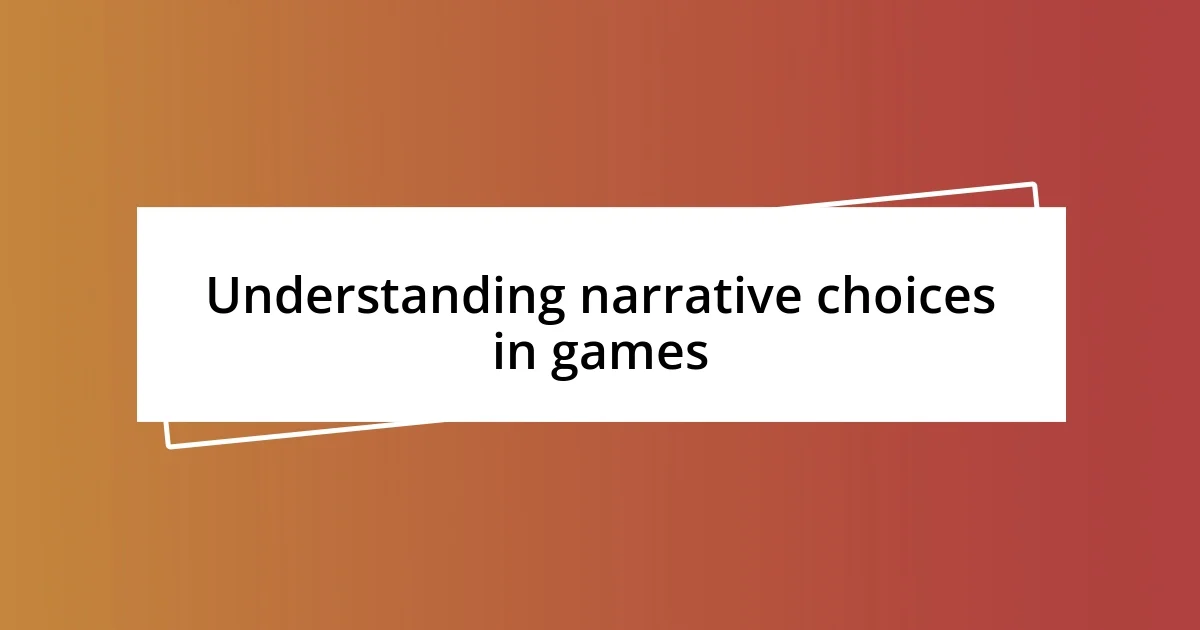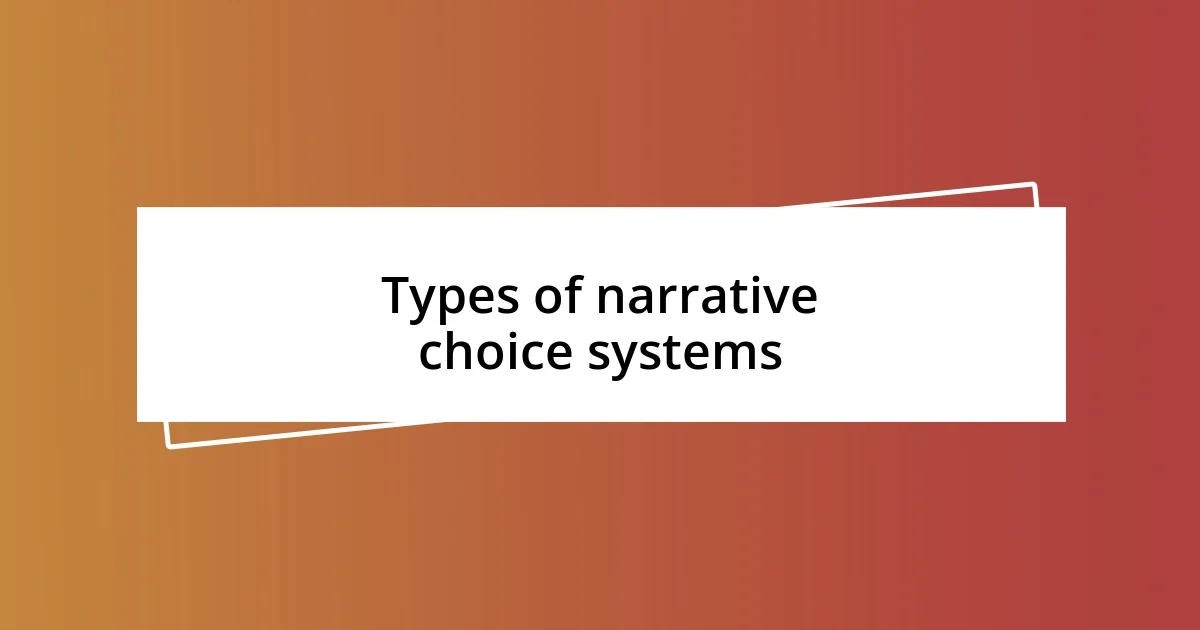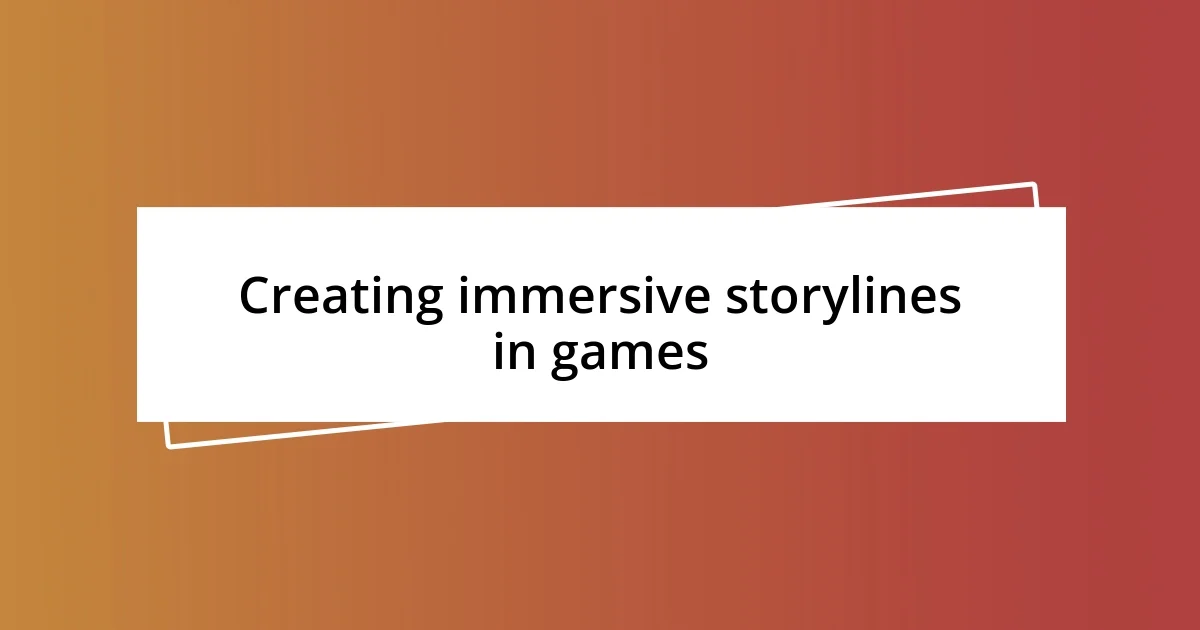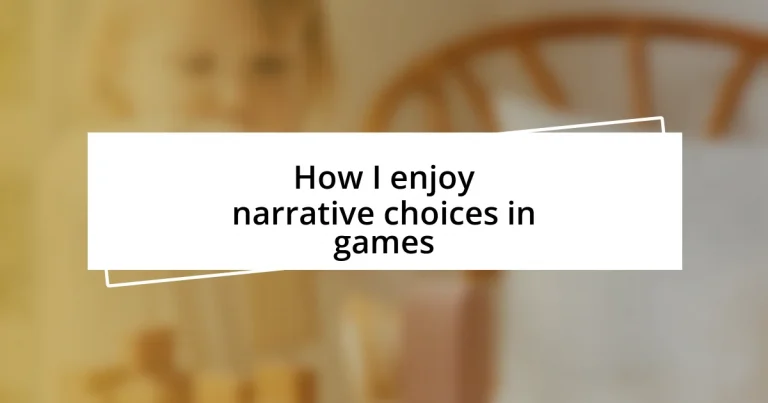Key takeaways:
- Narrative choices in games significantly shape the player’s emotional connection and self-reflection, allowing them to explore personal beliefs and values.
- Different narrative choice systems, such as binary, branching, and emergent, influence the depth of player engagement and control over the story.
- Community interactions enrich the gaming experience by sharing diverse interpretations and strategies, fostering a collective narrative tapestry among players.

Understanding narrative choices in games
Narrative choices in games are like the forks in the road that lead to dramatically different journeys. I still remember the moment in a role-playing game where I had to choose between saving a beloved character or securing the future of an entire village. That gut-wrenching decision left me pondering what “right” really meant in that moment. It made me realize how much weight these choices hold—not just within the game but personally, too.
When I look back at games like “The Witcher” or “Life is Strange,” I’m struck by how they weave player decisions into the fabric of their stories. Each choice I made shaped the outcome, making me feel like I was genuinely part of that world. Have you ever felt like your decisions in a game reflected your own values? For me, navigating moral dilemmas in these narratives became a way to explore my own beliefs and emotions, creating an enriching experience that transcended mere entertainment.
What fascinates me is the emotional connection these narrative choices foster. I recall the mixed feelings I had after betraying a character to gain an advantage, feeling both empowered and guilty. It’s this blend of emotions that elevates gaming from a passive experience to an active engagement with what it means to make hard choices. Each decision often leaves a lasting impact, encouraging me to reflect on my own life’s complexities and dilemmas.

Importance of player agency
Player agency is crucial in gaming, as it allows me to influence the story and outcomes based on my decisions. When I’ve faced pivotal choices, like deciding whether to uphold justice for a fleeting moment or help a friend in need, I feel like the character’s fate rests in my hands. This level of control not only enhances my connection to the story but also makes the virtual world more immersive and personal.
- It fosters emotional investment: Each choice transforms my gameplay experience, making every consequence meaningful.
- It reflects personal values: The decisions I make often echo my beliefs and ethics, prompting introspection.
- It promotes replayability: Knowing that different choices lead to different outcomes encourages me to revisit the game and experience alternate story arcs.

Types of narrative choice systems
Narrative choice systems in games come in various forms, each with its unique impact on the player’s experience. One memorable type is the binary choice system, where players must choose between two specific options that often lead to divergent storylines. I remember a moment in a visual novel where I had to decide whether to ally with a character I barely knew or go against their wishes, and the immediate consequences were palpable. This stark choice emphasized the weight of decision-making and left me contemplating my loyalties long after the game ended.
Another fascinating approach is the branching narrative system, which offers multiple options at various points throughout the gameplay. I recall my excitement when playing a fantasy RPG, where each dialogue option felt fresh and influenced not just immediate reactions, but far-reaching repercussions as well. This system creates a rich tapestry of intertwined stories that resonate emotionally as I navigate through the plot, often leading to surprises I never anticipated. It’s an engaging way to make the player feel like they are in control of their own destiny.
The most complex type is the emergent narrative system, where the choices players make dynamically shape the story in unexpected ways. In one sandbox game I played, I discovered that my actions not only affected the main storyline but also altered side quests and character interactions. This made me highly aware of my actions, often hesitating before making decisions, knowing that every tiny choice could ripple throughout the game world. I felt like a true architect of the narrative, which ignited a deeper sense of creativity and engagement than I’d ever experienced before.
| Type of Narrative Choice | Description |
|---|---|
| Binary Choice System | Offers two specific options that lead to distinct plot paths. |
| Branching Narrative System | Provides multiple dialogue choices affecting the storyline at various points. |
| Emergent Narrative System | Dynamic choices that shape the overarching narrative and character interactions. |

Analyzing popular narrative-driven games
When I dive into popular narrative-driven games, I often reflect on how they skillfully weave player choices into compelling story arcs. For example, in The Walking Dead, I found myself agonizing over whether to save a character in dire straits, knowing that my decision would not only impact the immediate scene but also ripple through future episodes. This kind of emotional weight is what keeps me invested, questioning my morals and second-guessing my instincts.
Then there’s the enchanting world of Life is Strange, where each choice feels like a step on a tightrope. I vividly remember the moment I had to choose between allowing a traumatic event to unfold or using my powers to intervene. The tension was palpable; I wrestled with my desire to change fate against the potential consequences. It’s this intricate dance of cause and effect that draws me in, making me think: how would I feel if I were truly faced with such dilemmas in real life?
Lastly, I can’t overlook games like Detroit: Become Human, which offers a maze of choices that offers not just variations in outcomes but an entire spectrum of experiences. Each time I played, I felt like an artist, shaping my narrative canvas with every decision made. I found myself pondering the implications of my choices long after I had put the controller down. Isn’t that what brilliant storytelling in games is all about? The ability to reflect on our own humanity through the lens of virtual decisions?

Tips for enhancing narrative experiences
To enhance narrative experiences in games, I always recommend embracing the emotional complexities of your choices. For instance, I once had a pivotal moment in a role-playing game where trusting a traitorous character meant risking everything I had built. This decision forced me to weigh my instincts against the potential fallout, and it made me realize how deeply I could connect with the narrative.
Another tip is to seek out games that offer nuanced character development. I recall playing a detective game where my interactions with NPCs (non-player characters) not only revealed their backstories but also provided me with moral dilemmas. Each choice was layered, allowing me to empathize with their struggles and view the world from different perspectives. This rich character development kept me engaged and made every decision feel consequential. How can we explore our values if we’re not challenged by the characters around us?
Finally, consider playing games that actively involve you in world-building. I once explored a sandbox adventure where every action shaped not just the main story but also the environment. I found myself planting trees as a means of healing the land, which felt profoundly satisfying. Each little choice, from the path I took to the allies I made, contributed to a living world. This involvement fosters a sense of agency, turning the gameplay into a personal journey. Isn’t that what we all crave—to leave our mark in the virtual worlds we explore?

Creating immersive storylines in games
When I think about creating immersive storylines in games, I can’t help but appreciate how a well-developed narrative draws me into its world. I remember playing Horizon Zero Dawn, where the combination of stunning landscapes and a deeply woven backstory made me feel like I was part of something much larger than myself. It wasn’t just about completing missions; it felt like I was uncovering ancient secrets alongside Aloy, and that connection is such a fundamental part of what makes storytelling in games so captivating.
Another aspect that enhances immersion for me is how games utilize environmental storytelling. In Bioshock, every corner of Rapture tells a story through its art design and audio logs. I clearly recall stumbling upon a submerged restaurant, where the remnants of a once-bustling dining scene hinted at moments of joy and despair. I could almost hear the laughter and the arguments, and that vivid imagery enveloped me in the game’s haunting atmosphere. Can you think of a moment when a game’s setting completely swallowed you whole?
Participating in shaping the storyline through choices truly elevates the experience. I was once faced with a heart-wrenching decision in a narrative RPG where I had to choose whether to sacrifice a beloved character to save a village. That moment forced me to confront my values and moral compass head-on. Would I prioritize the greater good over my personal attachment? This incredibly personal introspection is not just about gaming; it’s a reflection of how we navigate real-life choices, which is why I find these immersive stories so impactful.

Engaging with community narratives
Engaging with community narratives brings an entirely new dimension to gaming. I remember the time I joined an online forum about a popular open-world game. Players were sharing their unique choices and the unexpected consequences that followed. It felt like stepping into a shared story, where each player’s experience enriched my understanding of the game’s world. Have you ever connected with someone over a gaming moment that altered your perspective? It’s fascinating how narratives can weave us together, creating bonds that extend beyond the screen.
The power of community discussions often leads me to rethink choices I’ve made in my own playthroughs. For example, after discussing a pivotal quest in an MMORPG, I discovered alternate strategies that completely transformed the way I approached future quests. This back-and-forth exchanges filled me with excitement and prompted me to dive deeper into the lore. It’s like having a virtual book club, isn’t it? I believe these conversations help us to unpack complex narratives, making them far more enriching.
I find that community-driven content, like fan art and theories, can amplify my emotional connection to a game. I once stumbled upon an illustrated story that portrayed a character’s journey through loss and redemption. It resonated with me on a personal level, reflecting my own experiences with overcoming challenges. Each piece of community content invites me to experience the narrative from different angles, extending my emotional investment. How powerful is it to see how others interpret and shape the same story? It’s proof that storytelling in games is not a solitary journey—it’s a collective tapestry woven from individual experiences.














